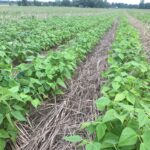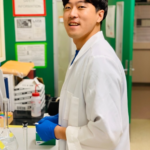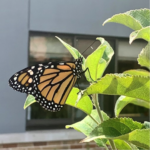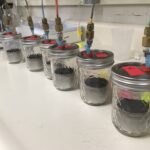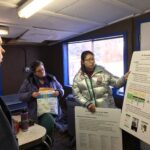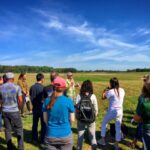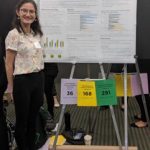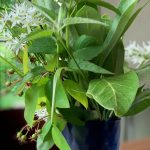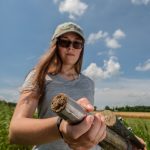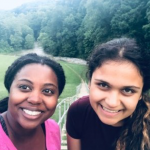Monica Jean, Educator with Michigan State University Extension (MSUE), shares details from the recent Cropping System Resilience Virtual Field Day, held July 2020. For the original article, see the MSUE website. MSUE teamed up with The Kellogg Biological Station Long-term Ecological Research (KBS LTER) program and farmers in the Central Southern region of Michigan to host a live Cropping System Resilience Virtual Field Day in July. The day included a farm tour and interactive questions from the audience. During the tour, topics discussed were relay cropping, interseeding covers, and
A new perspective – using bioenergy crops to alleviate global warming: Reflections from an LTER fellow
Jinho Lee is a PhD student in the Plant, Soil and Microbial Sciences Department at Michigan State University. He works in the Kravchenko lab with interests in carbon dynamics of soil. Today we are facing one of the biggest environmental challenges that our species has never faced, and one that is caused by our own actions. Since the Industrial Revolution, the worldwide carbon dioxide (CO2) emissions have increased due to use of C-based fossil fuels. This has resulted in global warming. To alleviate global warming and reduce the dependence on fossil fuels, several alternative
The metamorphosis of the monarch butterfly and the citizen scientist
Britney Christensen and Gabe Knowles joined Doug Landis' Lab through the NSF LTER RET Program (National Science Foundation's Research Experience for Teachers). This program matches K-12 teachers with local scientists for 8-10 weeks of field data collection and independent research. The goal is to enhance the professional development of K-12 science educators through research experience in order to then bring new knowledge into their classroom. Learn more about the KBS K-12 Partnership and future KBS RETs (professional development program supported by the KBS LTER). The
Understanding the role of microbial diversity in soil ecosystem functioning: Reflections from a LTER Fellow
Grant Falvo is a PhD student in the Plant, Soil and Microbial Sciences Department at Michigan State University. He works in the Robertson lab within the disciplines of soil microbial ecology and biogeochemistry and is interested in global change phenomena broadly. There are more microorganisms in a typical handful of soil than there are people on this planet. Every year these microbes emit >5 times as much CO2 as all the fossil fuel emissions emitted by humans. Yet recent research is beginning to uncover the dominant role these microbes play in stabilizing a similarly large
Supporting Michigan farmers using soil health assessment tools: Reflections from an LTER fellow
Graduate researcher, Xinyi Tu, is a graduate student advised by Dr. Sieglinde Snapp in the Department of Plant, Soil and Microbial Sciences Department at Michigan State University (MSU). The term “soil health” is similar to that of the health of an organism – it originates from the underlying connection of soil to animal and human health, and to the connection between soil and its living biota. However, there is no concensus amongst scholars as to what soil health means, and various definitions can be found in the literature. This confusion translates to farmers through the creation
Improving the sustainability of agricultural systems through educational research: Reflections from an LTER Fellow
Graduate researcher, Craig Kohn, is a dual-Ph.D. candidate with Dr. Andy Anderson in the Curriculum, Instruction, and Teacher Education Department and with the Environmental Science & Policy Program at Michigan State University (MSU). One of the key objectives of K-12 schooling in the United States is to prepare students to make more informed decisions in their personal and professional lives. This is particularly relevant for classroom science instruction. In fact, the need for more informed decision-making was a key motivation for recent widespread reforms in K-12 science
Learning the importance of interdisciplinary work: Reflections from an undergraduate researcher
Kellogg Biological Station (KBS) LTER 2019 undergraduate summer researcher, Ashlyn Royce. She wrote about her KBS LTER Research Experiences for Undergraduates (REU) project working with the Marquart-Pyatt Lab. The summer of 2019 I was selected to work with Dr. Sandy Marquart-Pyatt and her research team through the Michigan State University's Kellogg Biological Station (KBS) Research Experience for Undergraduates (REU) program, specifically working with the KBS Long Term Ecological Research (LTER) Panel Farmer Survey. After accepting the position, I was a bit unsure of what to
Join the Kellogg Biological Station community for a celebration of art and science
Richland, MI – What happens when one combines science and art? Scientists and other members of the W.K. Kellogg Biological Station community have spent the past several months exploring this question, and are gathering next month to showcase and celebrate the results of that exploration. The public is invited to the free event, called the Allurement Salon, from 6:30 to 8:30 p.m. Thursday, Nov. 7, in the Richland Community Hall, located at 8985 Gull Road, across from the Richland Harding’s Market. The salon will feature expressions of research and the natural world through original
A peek at life under a wheat field: Reflections from an LTER Fellow
MSU graduate researcher, Allison Zahorec, is a PhD student in Dr. Doug Landis’s lab in the Department of Entomology at Michigan State University. When one envisions a typical midwestern farm, ‘biodiversity’ is hardly the first thing that comes to mind. Compared to more natural landscapes, agricultural lands can seem like ecological dead zones. Yet even the most intensively managed corn monocultures are teeming with life belowground. A few teaspoons of soil can contain over a billion individual organisms (largely microbes), and the diversity of soil-dwelling organisms is just as
Diving deep into soil: Reflections from an undergrad researcher
Kellogg Biological Station (KBS) LTER 2019 undergraduate summer researcher, Aista Sall, from University of South Florida. She wrote about her KBS LTER Research Experiences for Undergraduates (REU) project working in Dr. Steve Culman's lab at the Wooster Campus of The Ohio State University. The midwest has always been a place I wanted to visit, due to its natural beauty and wide range of activities that it offers. So when the opportunity presented itself for me to do a dual Research Experience for Undergraduates (REU) for the Kellogg Biological Station Long Term Ecological Research (KBS
- « Previous Page
- 1
- 2
- 3
- 4
- 5
- …
- 10
- Next Page »
